The Fountain (2006)
Directed by: Darren Aronofsky
Written by: Ari Handel, Darren Aronofsky
Starring: Ellen Burstyn, Hugh Jackman, Mark Margolis, Rachel Weisz
USA/Canada
AVAILABLE ON BLU-RAY AND DVD
RUNNING TIME: 96 min
REVIEWED BY: Dr Lenera, Official HCF Critic
THIS REVIEW CONTAINS SPOILERS!
Three linked stories taking place in different times. In the 16th century, Spain is beset by civil war and Queen Isabella fears she may lose her country to the Inquisition, so she instructs conquistador Tomas Verde to travel to the New World to bring back the Tree of Life in the hope that it will save her country. In the present day, doctor Tom Creo is gradually losing his wife Izzi to a brain tumour but is so focused on finding a cure to death itself that he doesn’t seem to spend much time with her. And in the future, Tommy is travelling through space in a spacecraft that contains the Tree Of Life, aiming for the golden nebula of Xilbalba where he can bring Izzi, whose soul is in the Tree, back to life….
Funny how sometimes first and second viewings of a film can be very different to each other, even if these viewings are undertaken without much gap in between. The first time I saw The Fountain, I found it intriguing but overly morose and left the cinema barely understanding any of it. I wasn’t much moved by it either, but that may have been partly to do with the fact that my stepfather had recently of cancer at the time and I didn’t want to emotionally engage with the movie much. But I couldn’t stop thinking about it, to the point where I just had to go and see it again two weeks later. This time, Darren Aronofsky’s film was nothing less than a spiritual experience for me. I still didn’t understand everything in it, and, to be honest, I still don’t now, but I was incredibly blown away, profoundly touched yet also uplifted by what Aronofsky had put on screen. Something about it spoke to me and my deepest thoughts and emotions about the lofty themes of love, death and what is important in life. And still does. In fact now, at a time when I’ve just suffered another, and more terrible, loss, it’s just spoken to me again, and in an even more powerful way. Perhaps something told me that, one day, I would need this film after that uncertain first viewing, and told me to go back and give it another go.
Inspired by Aronofsky’s parents being diagnosed with cancer, The Fountain was originally planned in 2002 as a big budget production starring Brad Pitt and Cate Blanchett. Warner Bros. begun getting nervous about the spiralling budget and insisted that Aronofsky find a co-financier or the project would be shut down. One was found and the film was just about to be shot in Australia, with many of the sets already built. Then some script revisions Pitt asked for were refused by Aronofsky, so Pitt left, and, after Russell Crowe was asked to replace him, the film was shut down. Aronofsky turned his screenplay into a graphic novel [which is essential for anyone who likes The Fountain, as it reads like an intriguingly alternate and less ambiguous version of the movie], then in 2005, after scaling down aspects of the story, Aronofsky was able to resurrect the project again as a much more lower budgeted production with Hugh Jackman and his own girlfriend Rachel Weisz as the leads. With the exception of scenes filmed at a museum and a farmhouse, the whole film was shot on a soundstage in Montreal with mostly practical special effects, the scenes in the nebula done by using micro-photography of chemical reactions on petri dishes. After some minor cuts to violence to lower the rating, The Fountain was released to extremely polarising reactions and was a box office flop, though there was no way a film like this wasn’t going to go on to be a cult movie. Aronofsky has since said that he may put together an alternate cut of the film incorporating unused footage, and I really hope that he does this as long as he doesn’t suppress his original vision.
So what you basically have here are three stories told nonlinearly, which in itself makes it easy to understand why so many find the film incredibly hard work, though if I were to describe it to anyone I would call it, at least intellectually, Solaris meets The Hours [rather than a variant on 2001:A Space Odyssey which is how it’s often described], and of course Stephen Daldry’s melancholic time-shifting masterpiece remains much liked and admired, so films like this do occasionally reach a wide audience. The tales flow in and out of each other, interwoven with match cuts and recurring visual motifs, the middle story taking up the most screen time. Even weirder, they all feature the film’s two stars in different parts….as long as, of course, you believe that the parts are actually different. The core tale is of a man trying to find the cure for not only brain tumours but death itself while his wife is dying, while the other two still have fans of the movie debating as to what they represent. More seem to agree rather than disagree that the medieval story is a book that Izzy is writing, but all this future stuff involving a bald Jackman flying through space in a big bubble talking to a tree could either be Tom’s mind, Tom himself hundreds of years later having finally found the cure to mortality but tormented that it prevented him from joining his wife, or something else altogether. Aronofsky compounds the confusion by throwing in little details which don’t make much sense if you stick to any one explanation, while the very final scene even has two things going on in the same shot which actually happen centuries apart!
In the end though, I don’t think it really matters very much if attempts to work everything out tend to result in confusion [unless you really are very clever indeed]. In a way, the medieval fights [the film opens with a battle scene which probably causes some viewers to expect it to have plentiful action], space bubbles, spouting of flowers out of a man’s stomach, tai chi and other disparate ingredients, not to mention the influences from [take a deep breath] Kaballah, Buddhist, Hindu, Mayan, Taoist, Christian and New Age ideas, aren’t what is really important, even if they combine to make the film one that you have to admit is highly unique even if you don’t actually like it. What is really important is the message of coming to terms with death, whether of a loved one or yourself, a theme conveyed most touchingly in the moment when Tommy [the space traveller version of Tom] realises that he’s going to die, and smiles, because he finally understands that life, rather than death, is what he should have focused on throughout his existence, and especially during his life with his wife. Izzy tries her hardest to get him to understand this in nearly every scene the couple is together, from telling him she’s accepted her impeding death and feels at peace, to her writing this book that she wants him to finish, to her pointing out, in a museum, a Mayan painting showing the mythical creator of the universe the First Father and the words “death is an act of creation”. But the fool that is Tom just doesn’t have a clue.
The key scene in the film, its real heart, is the oft-replayed one of Izzy asking Tom to take a break from his obsessive scientific quests, quests which stand a high chance of resulting in failure, and just spend a bit of time with her.
Izzy: Take a walk with me
Tom: I have so much work
Izzy: It’s the first snow, we always…
Tom [interrupting]: I know, but they’re waiting on me
Izzy: Come on Tommy
Tom: Please Izzy. I’m sorry. I am. I’ll see you tonight okay?
Though I’ve put a spoiler warning near the top of this review, it’s probably actually not really much of a spoiler to say that Izzy does indeed die. And Tom’s refusal to take that walk in the snow ends up haunting him more than anything else. At the climax of the film, we see the scene replayed for the last time, only with a much better conclusion. Is this Tom just fully realising his mistake? Or is this, considering that the film is also about a search for enlightenment, Tom in the future, now centuries old and whizzing through space in a futile attempt to bring Izzi back to life, having now gained special powers and be able to travel into the past and correct the mistake he made? I prefer the second interpretation, as it’s the more imaginative one, but in the end it doesn’t matter. And in any case, the final ten minutes of The Fountain, when the stories climax and converge in on each other, are amongst the best ten minutes in cinema, the visuals, the editing and the music all combining to provide an incredible sensory experience even if you don’t understand all that’s going on. Like many of the best ‘weird’ films, such as David Lynch’s Inland Empire or Alejandro Jodorowsky’s The Holy Mountain, The Fountain, especially towards its end, seems to bypass the normal brain receptors and tap into something more primal that doesn’t need things like coherence or clarity; it’s all about the experience.
Jackman [it’s such a shame that he’ll probably be forever known first and foremost as Wolverine when films like this and Prisoners show what he can really do] deserved the Oscar for his incredibly powerful acting in this film, and is perfectly balanced by Weisz’s more inward, more knowing performance. Their best moment together is when she’s taking a bath and tells him that she no longer feels extremes of hot and cold….whereupon he jumps in the bath with her. It is perhaps here that, for me, The Fountain really shows the bittersweet wonder of human existence, plus the love between husband and wife. Cinematographer Matthew Libatique does a very clever job in enhancing Tom’s journey from darkness to light in all three stories by keeping him out of light at first, then gradually giving him more and more light as his understanding deepens. Meanwhile Isabella/Izzy is frequently awash with often white light. There are some shots in this film that are stunningly beautiful, like when Thomas first sees the Tree of Life, or Thomas walking through Isabella’s throne room where hundreds of gold lights appear to be hanging in the air with no support. Gold is the main colour employed throughout but it’s often varied in brightness and use throughout so the film doesn’t get visually monotonous. Meanwhile Clint Mansell’s score, performed by Mogwai and the Kronos String Quartet, effortlessly helps to bind things together with its obsessive minimalism. When I first saw The Fountain, I wished that it had had a more conventionally romantic score. Now, I can’t imagine the film without Mansell’s music. It may be conceptionally simple but it achieves a sad beauty and haunting power nonetheless.
I should probably say one final thing. It was actually my wife who died a few days ago. I wasn’t sure whether to watch The Fountain. I wanted to, but I wondered if it would be too upsetting for me to do so as there are certain parallels between movie and reality. But I’m now glad that I did put it on. While the pain that I have inside will be with me for some time and may never totally go away, I do think that the cathartic experience of me watching this ridiculously ambitious, yet at its core so simple, film was a good thing to do. I think it allowed me to exorcise a tiny amount of the hurt I feel and perhaps set me on a road to eventually finding some peace. However, even disregarding all this personal stuff I’ve felt a need to bring to this review, I think The Fountain is a true work of art and a genuinely transcendental experience.
Rating: 










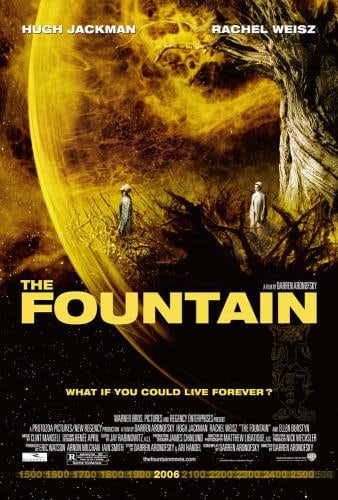
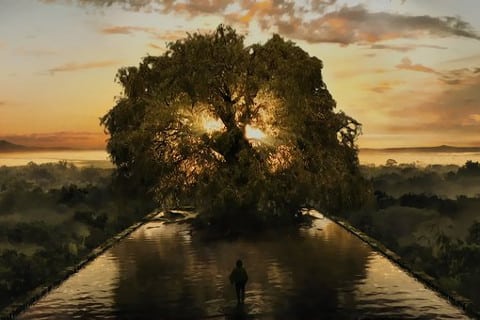
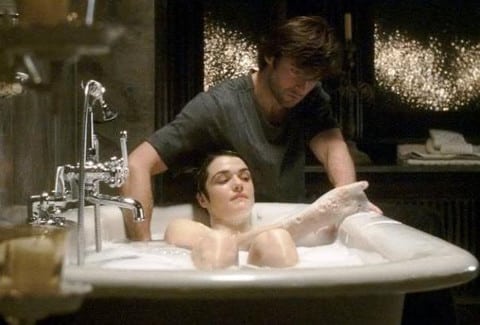
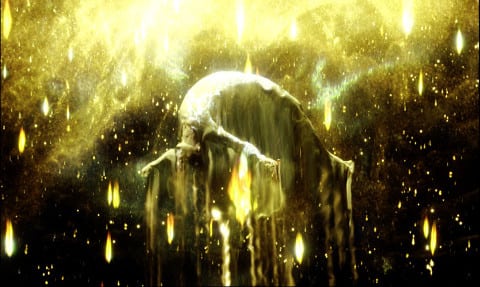

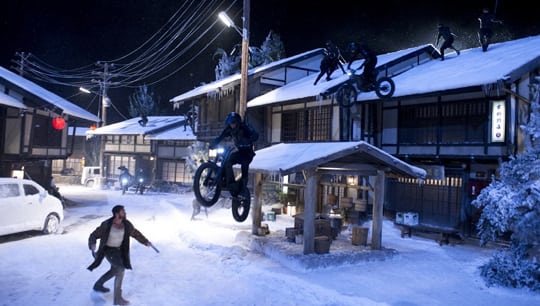

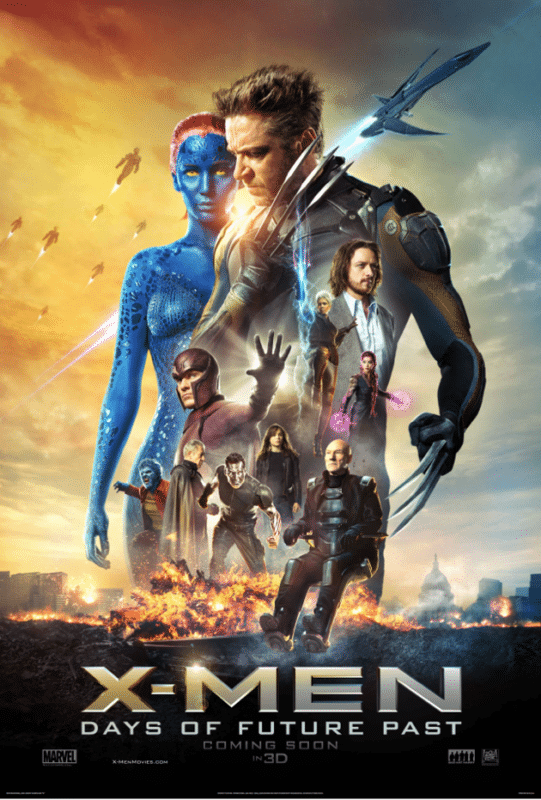
Another amazing review from the Doctor. His encyclopaedic knowledge of the film world, his brilliant use of English and, above all his insight into the deeper meanings of the subject film, all combine to create a piece of literature which deserves to be read by a much wider audience. No wonder the wife he recently, tragically lost was so very proud of him.